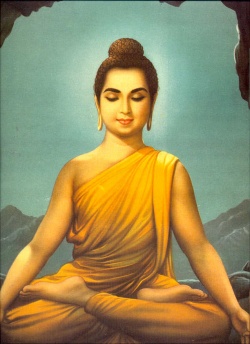Path
Click here to see other articles relating to word Path
Path (Skt. marga; Tib. & Wyl. lam) — the spiritual journey, which must be followed in order to attain the result, which is enlightenment. The Buddha spoke of the path in his first teaching on the four noble truths as the noble eightfold path. In other teachings, the path is described as consisting of five stages, known as the five paths, although they are in fact not separate paths but rather five stages on the same path. On a deeper level, the path refers to the wisdom, which is required to realize cessation.
Alternative Translations
- Alexander Berzin translates lam as 'pathway mind' or 'pathway of mind' and gives the following definition for lam: "A level or state of mind that acts or functions as a pathway toward liberation or enlightenment. Some translators render this term as 'path,' but it refers to mental states, not to a series of spiritual practices."
Source
path
趣・道 (Skt, Pali gati; Jpn shu or do )
In Buddhism, the state of existence into which one is reborn as a result of karma or causes formed through one's actions in the previous existence. The Sanskrit gati derives from the root gam, which means "to go." Buddhism set forth the concept of the six paths (gatis), or six paths of existence: the realms or states of hell, hungry spirits, animals, asuras, human beings, and heavenly beings. Originally these were thought of as physical locations; later they came to represent the states or conditions of life that living beings experience. These correspond to the lowest six of the Ten Worlds. The first three or four are called evil paths, durgati in Sanskrit, because one is reborn into them as a consequence of one's past evil actions or bad karma. There is also a concept of five paths, which excludes the realm of asuras.
See also: Ten Worlds.
The Golden Path is a term in Frank Herbert's fictional Dune Universe referring to Leto Atreides II's strategy to prevent humanity's ultimate destruction. The Golden Path is the main driving force in the Frank Herbert-written novels Children of Dune (1976), God Emperor of Dune (1981), Heretics of Dune (1984), and Chapterhouse: Dune (1985), and is brought to its conclusion in the novels which complete the original series, Hunters of Dune (2006) and Sandworms of Dune (2007) by Brian Herbert and Kevin J. Anderson.
Leto named the necessities shown in his vision the "Secher Nbiw", which is "Golden Path" or "Golden Counsel" in an ancient Language known only by Leto II and his twin sister, Ghanima
Path of Love is a powerful personal development process providing lasting results that expand over time and integrate gracefully into your Life. While you will also experience incredible insights and deep understandings, Path of Love offers the potential for real enduring change.
Evolution is considered by some to be path-dependent: mutations occurring in the past have had long-term effects on current Life forms, some of which may no longer be adaptive to current conditions. For instance, there is a controversy about whether the panda's thumb is a leftover trait or not.
An influential attempt to rigorously formalize path dependence within political science is that of Paul Pierson, partly drawing on ideas from economics. Herman Schwartz has questioned those efforts, arguing that forces analogous to those identified in the economic literature are not pervasive in the political realm, where the strategic exercise of Power give rise to, and transform institutions.
The path-dependence of emergent strategy has been observed in behavioral experiments with individuals and groups
Beyond personal awareness and growth you will enjoy permanent and positive shifts in the quality of your Life:
The confidence and passion you bring to Life
The depth and authenticity of your relationships
To utilize your talents and abilities more constructively
To recognise positive change you create in the World
To Love & experience true fulfillment in your Life
